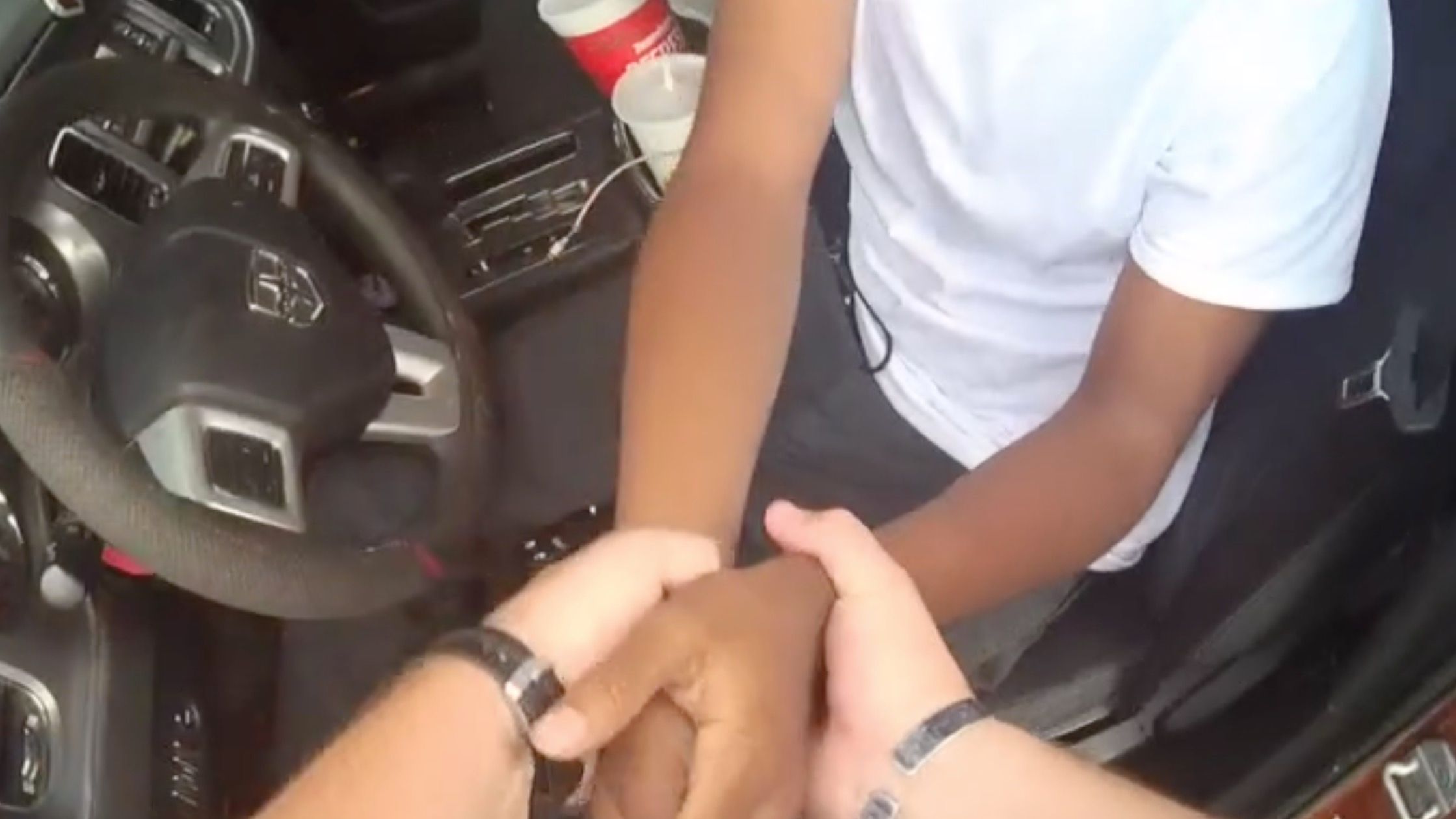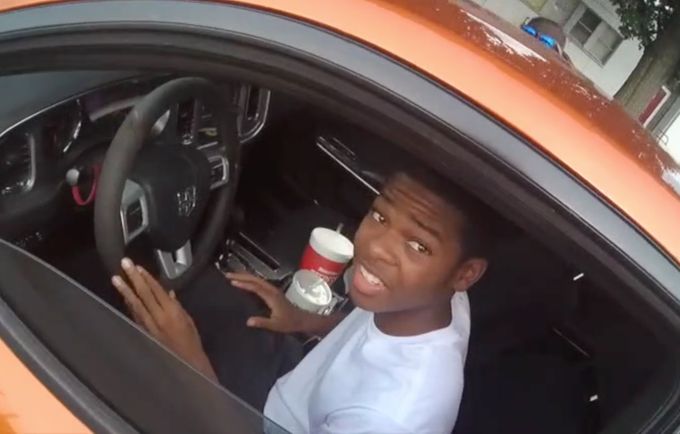1 MILLION PEOPLE HAVE VIEWED A VIDEO OF A LOUISVILLE TRAFFIC STOP ON YOUTUBE. MANY SAID IT SHOWS EXACTLY WHY MINORITIES DISTRUST LAW ENFORCEMENT.
Published 7:46 a.m. ET April 4, 2019 | Updated 6:56 a.m. ET April 5, 2019
He was homecoming king at Central High School and had just graduated with several scholarships.
He had never been arrested or in trouble before and had a steady job selling new cars at a major dealership.
But 18-year-old Tae-Ahn Lea is black and lives in Park Duvalle, in Louisville’s West End. And when he borrowed his mom’s car to go get a slushie one day last August, he found himself being pulled over by the Louisville Metro Police Department’s Ninth Mobile Division for the most minor of traffic violations — making a “wide turn” onto another street.
Before he was let go 25 minutes later, he was pulled from his car, frisked and handcuffed. His car was searched by a drug-sniffing dog, then by police officers who went through his wallet and even looked under the lid of his drink for contraband.
He was forced to stand on the street, embarrassed, as traffic drove by, with the cuffs chafing his wrists, as one officer asked him, “Why do you have this negative view towards the police?”
An update to this story: ‘Police need to find a better way:’ Louisville officials want answers about black teen’s traffic stop
Nearly 1 million people have since viewed a video of the traffic stop on YouTube, and more than 17,000 have commented on it. Many said it shows exactly why minorities distrust law enforcement.
Louisville Metro Police Department bodycam footage of Tae-Ahn Lea during a stop on Aug. 9, 2018.Louisville Metro Police Department video
“Cops have a habit of making citizens enemies for life,” one commentor said.
Police experts who viewed the video for the Courier Journal say that while the stop — except for the frisk — was legal, it was disturbingly disproportionate to the alleged offense and it showed the kind of bad policing that undermines the department’s need to be effective.
LMPD Chief Steve Conrad has said that aggressive policing in high-crime areas reduces violent crime. He declined to comment on Lea’s stop last Aug. 9, citing a pending investigation of the officers involved.
Previously: Was Kevin Cosby pulled over for driving an Audi in the West End?
A police stop turns contentious
“Do you know why I stopped you?” Detective Kevin Crawford asked Lea after pulling him over.
Lea had no idea, he said.
“When you turned … you turned in to the far left lane,” Crawford said. “You’re supposed to turn in the right lane.”
Lea, expecting to get a citation, followed orders, even asking for permission to reach into his pocket to get his license. But the officer grabbed him by both wrists and pulled him from the car.
“Mama, they are taking me out of the vehicle,” he cried out to his mother, who had called on his cellphone.
Three times Crawford asked Lea if he had any drugs or weapons. Three times Lea told him no.
Crawford frisked him, though Lea had done nothing to indicate he was “armed and presently dangerous,” as the U.S. Supreme Court requires before such a search.
Read this: You’re more likely to be busted for weed in Louisville if you’re black
“Put your hands on the car and spread your feet,” Crawford demanded.
“What are you checking me for?” Lea asked. “I told you I didn’t do anything. … Why’d you f—— took me out of the car?”
“We are allowed to,” Crawford’s partner, Detective Gabe Hellard, said.
“This is some bulls—,” Lea said.
“Quit with the attitude,” Hellard told him. “Stop the clenching-your-fist thing. We’re here for you. There’s a shooting every day. Ain’t nobody been nasty to you at all.”
Police found nothing on Lea, so they asked permission to search the car. Lea declined, as is his right.
Then they brought in a police dog that they said “alerted” them to contraband inside Lea’s mother’s 2011 Dodge Charger, although it is not apparent on the body camera footage from the officers who came to the scene.
But it gave police probable cause to search the car.
And to place Lea into handcuffs.
“You’re not under arrest, but you are not free to go,” Hellard told him. “I’m not going to fight you and I’m not going to chase you. I had to chase some guy last night, and I haven’t recovered from it.”
‘They approach this young man as a threat’
Experts on policing, including some former officers, used words such as “deplorable” and “depressing” to describe the stop.
They said the officers were doing what they were told — trying to find guns in a high-crime area to cut down on violent crime.
But as former Tallahassee Police Department Officer Seth Stoughton, now a law professor at University of South Carolina, puts it, it is “an excellent example of the difference between lawful policing and good policing.”
“They approach this young man as a threat — as a criminal,” said Stoughton. “And that is different than the way we want officers to interact with people.”
The authorities also say traffic stops don’t work as a crime-fighting tool. A study released in November of nearly 2 million traffic stops in Nashville, Tennessee, for example, found they failed to reduce crime in the short or long term.
Study: Traffic stops don’t reduce crime. But Louisville police insist they work
‘What did you pull him over for?’
Seven minutes had elapsed, but the stop was far from finished.
By now, Lea was handcuffed on a busy street, standing in front of a police cruiser and worried that somebody might see him.
He watched as the police dog jumped from seat to seat and as police tore through the vehicle.
One officer used a plastic crowbar to pry off the cover on the electric window buttons.
A second rifled every item in Lea’s wallet after the dog allegedly showed an interest in it.
“Sir, have you had anything in your wallet like narcotics — anything that could have touched your wallet?” canine officer Jeff McCauley asked.
Lea shook his head no.
His mother, Tija Jackson, a juvenile probation officer and private investigator, arrived at the scene, where the three white officers were holding her son.
“What did you pull him over for?” she asked Crawford, who threatens to take her to jail if she doesn’t stay back. “There is nothing in there. It’s my car.”
“I am the detective who pulled him over,” Crawford said. “He committed a traffic violation. He conducted an improper turn on to 18th Street.
“Luckily for you, ma’am, everything was captured on body camera,” he added.
“Luckily enough for you,” Jackson said.
“Oh, really,” the officer replied.
As the search continued, Hellard tries to engage Lea in conversation.
“Have you been in trouble before?” the officer asked.
“None,” Lea shook his head, shifting nervously from one foot to the other.
“Anything as a juvenile at all?” Hellard asked.
No, Lea said.
Hellard asked where Lea works. “You say you sell cars at Oxmoor Ford Lincoln?”
“That’s good money,” Hellard said. “You actually like a car salesman?”
‘If it’s a wrong turn, give him a ticket’
Police found nothing in the car.
McCauley announced he was going to try to calm Lea’s mother down, but they ended up in a confrontation.
“Are you Mom? Are you doing all right?” he asked.
“I’m pissed off, for real,” she said.
“What you pissed off for?” McCauley asked.
“My son … is a working young man,” she replied. “He doesn’t cause no problems. And they took him out of the car. And he asked, ‘Why you taking me out of the car?’ And he said, ‘Cuz I can.’
“If it’s a wrong turn, give him a ticket,” she said.
“That’s not what we’re out here for,” McCauley responded. “We are a violent crimes unit.
“We don’t pick and choose where we work. We are told by our commanders, by the chief’s office, where to patrol, and all that is based off criminal violence statistics. The 18th Street corridor, Victory Park, Park Hill, they are the areas we are told to patrol. That’s why we are here.
“We are just doing our jobs to try to make the city a little safer,” he said.
“I don’t want the history,” she interrupted. “I just want to know why my son …”
He cut her off. “I’m trying to explain, but you don’t want to hear it.”
“I’m not here that for that,” she said. “I don’t need the sass. I appreciate you being out here for violent crime. My son is not a violent nothing. He’s never been in JCYC (the Jefferson County Youth Center) — nothing. He got a job.”
“I’m not saying he is a violent criminal.”
“So, why is he out of the car in handcuffs?”
“I came over here to try to explain it to you, but you don’t want to hear it. You don’t want to hear the truth.”
“If it doesn’t have nothing to do with my son, I don’t want to hear it,” she said before walking away. “I am dealing with my son right now.”
‘Why do you have this negative view towards the police?’
Meanwhile, Lea was still standing on the street in cuffs, which were pulling at his wrists. He’d been out of the car for nearly 20 minutes, as traffic passed by, with him in plain sight.
Hellard was still talking to him.
“If you don’t mind me asking,” he said, “why do you have this negative view towards the police? What has ever happened in your life personally where you can give me a good explanation?”
“Absolutely nothing,” Lea said.
“So, why are we in this situation?” Hellard asked.
“You!” Lea responded, his voice rising. “F—ing you!”
“We don’t know who you are,” Hellard said. “I don’t know that you graduated and got several scholarships and have a good job. You can continue with your negative view towards me, I guess. I just figured I would try to understand.”
“You will never understand,” Lea said.
The stop was winding down.
Driving while black: Lawyer says he was racially profiled in luxury car
Out of the hearing of the mother and son, McCauley complained to other officers that Jackson would “make stuff up” and “spill that over the internet. She’ll get a thousand likes. It’s a disease.”
Then he got in his car to leave. “Good girl, Ripley,” he said to his dog.
Hellard asked Lea, “If I take you out of these handcuffs, are you going to fight me? I know you’re mad.”
The young man, who stands 5 foot 8 and weighs 140 pounds, answers no, and his arms are freed.
Twenty-four minutes after Lea was stopped, Crawford finished writing the citation and handed it to him.
“Have a wonderful day,” he said.
‘Nothing about this kid suggested he was a gangbanger’
Two months later, a judge dismissed the traffic citation against Lea.
Neither Crawford nor Hellard, who issued the ticket, showed up in court to defend it.
Policing experts who viewed the video for the Courier Journal, including Margo Frasier, the former sheriff of Travis County, Texas, said it was a “chickens—” violation and obviously a pretext for making the stop.
That itself wasn’t illegal, said Frasier, who later monitored the Austin, Texas, police department and now serves as the federally appointed chief monitor for the Orleans Parish Sheriff’s Office in Louisiana.
And she said police had the legal right to make Lea get out of the car. But she said there was no basis for searching him after he was removed from his car, which made the frisk illegal.
More coverage: Rev. Kevin Cosby’s traffic stop was not racial profiling, Conrad says
Both the Supreme Court and Louisville police say a pat down may be conducted only on reasonable grounds that the subject is armed and dangerous.
“Nothing about this kid suggested he was a gangbanger who had three AK-47s in the car,” she said.
The officers also violated LMPD policy, as set out in its standard operating procedures, by failing to identify themselves and failing to ask if there was a legitimate reason for what the driver did.
Traffic stops have been controversial in Louisville.
The Courier Journal reported in January that black people are cited at six times the rate of white people for possession of marijuana, and that most are charged after being stopped for minor violations.
Lea’s stop came about a month before the Rev. Kevin Cosby, senior pastor of St. Stephen Baptist Church, was stopped at the corner of 22nd Street and Muhammad Ali Boulevard for an alleged traffic violation.
Cosby, who is also president of the historically black Simmons College, later said he was treated like a criminal during the stop, although Conrad announced last month that an investigation found no evidence of racial profiling.
‘If I were him, I would have had an attitude too’
In Lea’s stop, Frasier and other experts said he showed remarkable patience and restraint.
“If I were him, I would have had an attitude too,” she said.
Stoughton, the former Tallahassee officer, said the overarching problem with the stop was not that it was illegal, but that it was inappropriate and counterproductive.
“People obey and cooperate with police when they trust them,” he said. “That view is undermined when they are seen as abusing their authority.”
Even in high-crime areas, most people aren’t criminals, he said, “so it can really rub community members the wrong way when they are all viewed as targets for investigation.”
Frank Baumgartner, a University of North Carolina political science professor and author of “Suspect Citizens: What 20 Million Traffic Stops Tell Us About Policing and Race,” said hot-spot policing like that practiced by Louisville police is a “standard practice” but a “bad idea.”
He said his study of 20,000 stops in North Carolina found that most came up dry — that police rarely found guns or other contraband.
“Go to a high-crime area and find a man of color in a nice car,” is how Baumgartner described the strategy. “It’s a needle in the haystack approach that isn’t paying off, given it alienates tens of thousands of people a year.”
In the Louisville stop, he said, “Obviously it alienated that young man and infuriated his mother, and it didn’t lead to anything. It is one little nick taken out of community relations and the trust the community of police.”
In an email, Jessie Halladay, a Louisville Police spokeswoman, said “we see examples of cooperation between police and the community every day.”
But, she said, “there is always room for improvement” and the department understands “tension exists between the police and community, particularly as it relates to traffic stops.”
She said the agency is “developing a public engagement effort” to be announced in coming weeks “that will lean into our relationship with the community.”
But she said the department won’t reconsider its tactical use of traffic stops because it is “an effective strategy to help control crime.”
Lea, who now attends Tri-City Barber College in Louisville and is selling cars again part time, told the Courier Journal the mayor and police chief need to put a stop to such stops.
“They could go wrong very easily, with somebody who had a little more of a temper than me,” he said.
Jackson said such pretextual stops only create more friction between the community and police.
She and her son have retained a lawyer, Lonita Baker, and expect to file a lawsuit.
“We want to let people know what they are doing — and not just to my son,” Jackson said.
Louisville’s Green Book: Buildings once essential to black travelers keep vanishing
Andrew Wolfson: 502-582-7189; [email protected]; Twitter: @adwolfson. Support strong local journalism by subscribing today: courier-journal.com/andreww.
Source: Louisville police criticized for handcuffing black teen for wide turn


